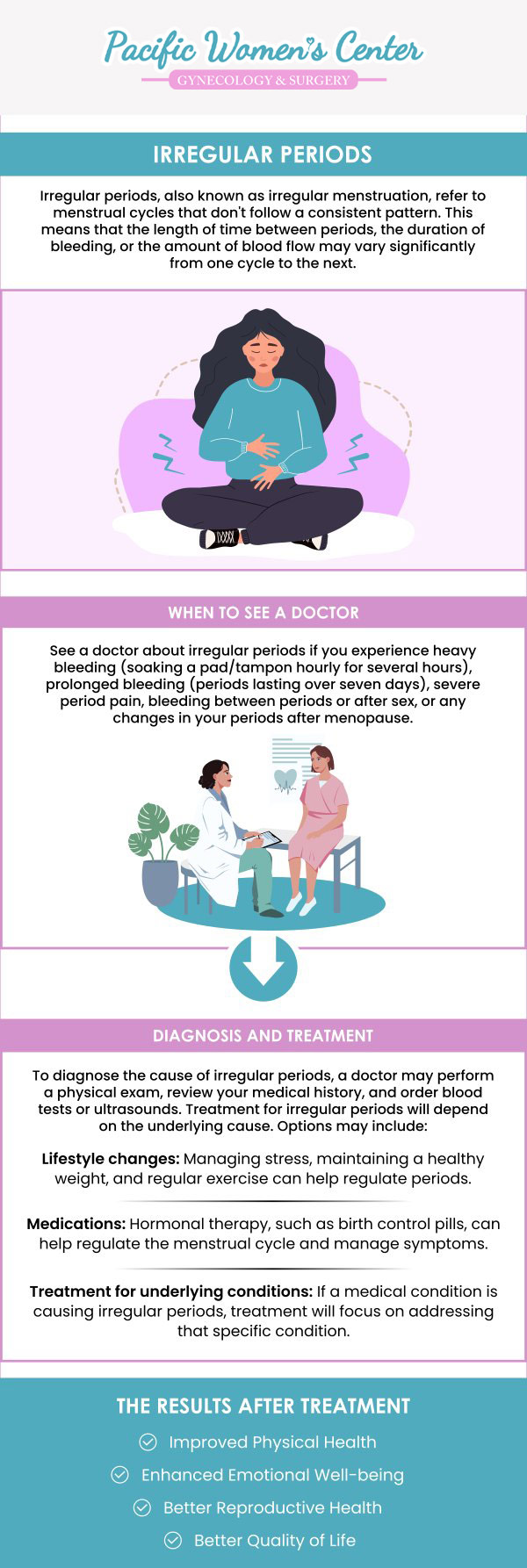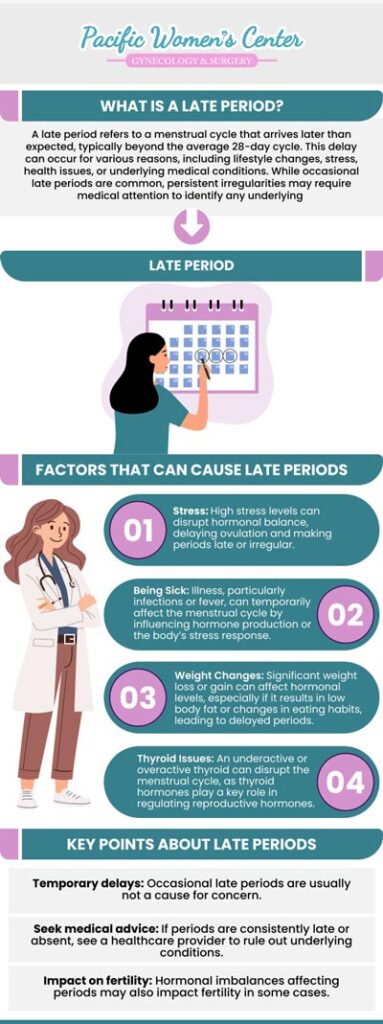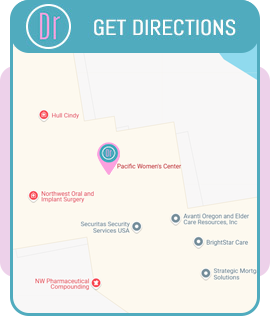Irregular Periods: Why Is My Period Late?
A period can be delayed by various factors, including stress and hormonal changes due to medical conditions like PCOS. Effectively managing late periods requires addressing the underlying cause. To resolve your symptoms and ensure timely menstruation, irregular period diagnosis and treatment are available at Pacific Womsn’s Center in Eugene, OR. For more information, contact us today or schedule an appointment online. We are conveniently located at 911 Country Club Rd Suite 222, Eugene, OR 97401.




Table of Contents:
Why is my period irregular?
Is it normal for irregular periods to be late?
What health conditions cause irregular periods?
How can I fix my late period?
At Pacific Women’s Center, we understand the challenges and discomfort that can come with irregular periods, also known as menstrual irregularities. The cause of these can range from hormonal imbalances to lifestyle factors, and even certain types of medication.
Hormonal imbalances, commonly present in conditions such as Polycystic Ovary Syndrome (PCOS), thyroid disorders, Cushing’s syndrome, and prolactinomas, can often be a root cause of irregular periods. This can result in your period being late, early, or missed entirely.
In addition to medical conditions, your weight can significantly impact your menstrual cycle. Whether you’re overweight or underweight, you may experience irregular periods. Rapid weight changes can lead to amenorrhea (the cessation of periods) or more frequent or irregular menstrual bleeding.
Lifestyle factors, such as extreme emotional stress, sudden life changes, excessive exercise, poor nutrition, and sleep disturbances, can also disrupt your regular menstrual cycle. For instance, women participating in activities requiring rigorous training may find their menstrual cycle interrupted due to a decrease in body fat.
Certain types of contraceptives and other medications can cause menstrual irregularities. For example, birth control pills, hormonal replacement therapy, antidepressants, steroids, antipsychotics, cancer chemotherapy, and blood pressure drugs can all affect your menstrual cycle.
Underlying medical conditions like anemia, cancer, pelvic inflammatory disease (PID), endometriosis, and uterine fibroids can also contribute to irregular periods.
Finally, pregnancy and miscarriage can lead to irregular periods. Pregnancy results in the cessation of periods, while a miscarriage can lead to early or delayed periods.
At Pacific Women’s Center, we provide comprehensive care for women experiencing irregular periods. We conduct thorough evaluations, including a medical history, physical examination, and diagnostic tests, to determine the specific cause of the irregularity.
Your health and well-being are our priority. If you’re experiencing irregular periods, don’t hesitate to reach out to us for expert care and treatment.
Irregular periods or delayed menstruation is not uncommon among women, especially during their adolescent years or as they approach menopause. This denotes changes in the length of the menstrual cycle that may vary from month to month and sometimes lead to a delayed period.
There are several potential causes for these irregularities, including stress, changes in weight and diet, certain medications, underlying health conditions, pregnancy, and menopause.
At Pacific Women’s Center, we believe that while occasional irregular periods and late menstruation can be part of normal variations in a woman’s cycle, persistent irregularity or significant delays may be indicative of underlying health issues. Therefore, if you’re experiencing persistent irregular periods, especially those with prolonged delays, or have accompanying symptoms such as pelvic pain, excessive bleeding, or unusual discharge, we highly recommend seeking medical attention promptly.
Our dedicated team is committed to providing comprehensive, compassionate care to all patients. If you have concerns about your menstrual pattern or any aspect of your reproductive health, do not hesitate to reach out to us for an accurate diagnosis and personalized treatment plan.
At Pacific Women’s Center, we offer comprehensive care for women experiencing irregular periods, also known as oligomenorrhea. Irregular periods are often indicative of various health conditions, including hormonal imbalances, pituitary disorders, and lifestyle factors.
If you are suffering from the hormonal disorder Polycystic Ovary Syndrome (PCOS), which often causes enlarged ovaries with small cysts on the outer edges, leading to irregular ovulation and menstrual cycles, our team can provide diagnosis and treatment.
We also provide care for women with thyroid disorders, Cushing’s Syndrome, pituitary disorders, and other conditions that can disrupt your menstrual cycle. If you suspect that you’re pregnant or transitioning into perimenopause, we can provide the necessary care and guidance during these important life stages.
We also specialize in identifying and treating uterine abnormalities such as fibroids and polyps and painful disorders like endometriosis, which can cause heavy or irregular periods. If you’re suffering from pelvic inflammatory disease, an infection of the reproductive organs, or celiac disease, we can provide the appropriate treatment to manage your symptoms and restore your menstrual cycle.
Menstruation can be unpredictable typically following a 28-day cycle, variations from 21 to 35 days are considered normal. A late period refers to the delay of menstrual bleeding beyond the expected start date by more than seven days.
There are several reasons your period might be late, including stress, weight changes, certain medications, polycystic ovary syndrome (PCOS), and of course, pregnancy. Our team is dedicated to identifying changes in your lifestyle or conditions that could be impacting your menstrual period.
Common Causes of Late Periods
Pregnancy: This is the most common cause of late periods, especially if sexual intercourse has occurred. If there’s a chance you could be pregnant, a late period could be the first sign.
Hormonal Imbalances: Conditions like thyroid problems and PCOS can affect hormonal balance and delay periods. Our experienced providers can diagnose and offer treatment for these conditions.
Medications: Certain medications including steroids, antidepressants, and birth control pills can interfere with ovulation and menstruation. Dr. Richard Beyerlein MD, CPI, FACOG, and Tamara A. Stenshoel, MD, FACOG can work with you to determine if your medication is impacting your period.
Lifestyle Factors: Extreme exercise, drastic weight loss, or significant stress can disrupt hormonal regulation and lead to late periods. We can provide advice and resources to help manage these factors.
Medical Conditions: Certain medical conditions, such as uterine fibroids, endometriosis, or pelvic inflammatory disease (PID), can also cause late periods.
How to Fix Late Periods:
At Pacific Women’s Center, we’re committed to helping you address late periods by identifying the underlying cause.
Take a Pregnancy Test: This is the first step to rule out pregnancy as the cause.
Consult a Healthcare Provider: Our team is here to help. We’ll discuss your symptoms and potential causes.
Address Underlying Conditions: If a medical condition is causing your late periods, we’ll develop a treatment plan.
Lifestyle Modifications: We can offer guidance on modifying an individual’s lifestyle to manage your period.
Medication Adjustments: If medications are causing late periods, we can adjust the dosage or prescribe alternative medications.
Hormone Therapy: In some cases, hormone therapy may be used to regulate menstrual cycles and induce ovulation.
Surgical Intervention: In rare cases, our professionals may recommend surgery to address conditions like uterine fibroids or endometriosis.
For more information, contact us today or schedule an appointment online. We are conveniently located at 911 Country Club Rd Suite 222, Eugene, OR 97401. We serve patients from Eugene OR, Lowell OR, Cottage Grove OR, Junction City OR, Coburg OR, Springfield OR, Creswell OR, and the surrounding areas.

ADDITIONAL SERVICES YOU MAY NEED
❱ Abdominal Hysterectomy
❱ Bladder Lift Surgeon Q&A
❱ Cervical Cone Biopsy
❱ Colposcopy
❱ Endometrial Ablation
❱ Endometrial Biopsy
❱ Female Sexual Dysfunction
❱ Gynecological Surgery
❱ Gynecology
❱ Hormone Therapy
❱ Vaginal Hysterectomy
❱ Endometriosis Diagnosis & Care



